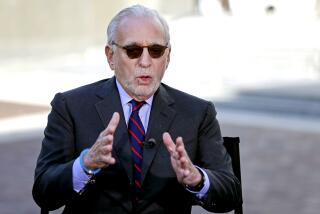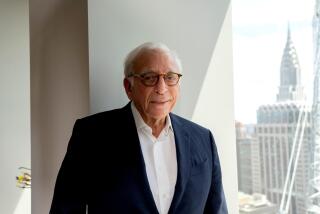LeBow Enlists Ex-Chief of CalPERS in RJR Bid
NEW YORK — Financier Bennett LeBow on Wednesday recruited a top British tobacco executive and the former head of California’s public employee pension fund for his campaign to get RJR Nabisco Holdings Corp. to spin off its food business.
In an apparent effort to reassure RJR shareholders about his intentions, LeBow also outlined steps his nominees will take if they are elected to replace the current RJR board later this year.
In addition to an immediate spinoff of the food business, LeBow said, his nominees hope to pay dividends on RJR stock at an annual rate of $2 a share, compared with the current $1.50.
He also sought to defuse criticism that he is driven by selfish motives, saying he would erect safeguards against inappropriate dealings between RJR and his Brooke Group Ltd., which owns the smaller tobacco concern Liggett Group Inc.
The moves were announced a day after Brooke Group claimed it had received support from holders of a majority of RJR shares for its nonbinding proposal that the tobacco company immediately spin off its Nabisco food holdings.
RJR had vigorously campaigned against the proposal, saying it was ill-timed, and the company continues to question LeBow’s motives.
RJR is the nation’s second-biggest tobacco company, with brands such as Winston and Camel, and owns 80.5% of Nabisco Holdings Corp., the maker of Ritz crackers and Oreo cookies.
On the New York Stock Exchange, RJR shares rose 75 cents a share to $33.375; Nabisco Holdings was unchanged at $35.625.
LeBow said Ronald S. Fulford, executive chairman of Hanson’s Imperial Tobacco division, had stepped down from that post this week to take the reins at RJR should LeBow’s slate of nominees for the board be elected.
Fulford is credited with the financial turnaround at Imperial since taking over in 1987, LeBow said. Imperial has become Britain’s second-biggest tobacco company.
Under terms of the contract, Fulford would become a consultant to Brooke Group and be paid about $600,000 a year. If Brooke Group’s slate wins, Fulford will run RJR Nabisco and later RJR Tobacco and be paid $1 million plus other benefits.
LeBow also said Dale Hanson, who was chief executive of the California Public Employees’ Retirement System from 1987 to 1994, would be one of his group’s 10 nominees to the RJR board, which will be up for election at this year’s annual meeting. The other nine nominees were announced earlier.
CalPERS is the biggest public employee retirement system in the nation, and Hanson is known as an advocate of shareholder rights.
David Adelman, tobacco analyst for the investment firm Dean Witter, said that to the extent LeBow can “recruit high-profile, visibly independent outsiders, I think the more credible his slate becomes.”
But Adelman said it is too early to assess LeBow’s chances, saying that depends on what RJR may do between now and the board meeting on issues such as its dividend and stock repurchases and how comfortable RJR shareholders are with LeBow.
Roy Burry, tobacco analyst for Oppenheimer, said “it is a much bigger decision for RJR shareholders to decide should we turn RJR over to an outside group than it was to vote on a nonbinding referendum.”
On Tuesday, the dissident group of shareholders led by Brooke Group said their preliminary count showed that 50.4% of RJR’s more than 281 million shares were cast in favor of the resolution for the immediate spinoff.
RJR said it would take up to three weeks to verify the results. But it said whatever the results, it still felt an immediate spinoff was a bad idea.
RJR said Wednesday that it was examining LeBow’s latest filing and had no immediate comment on it.
Both RJR and LeBow, who along with onetime corporate raider Carl Icahn controls about 4.8% of RJR stock, support a spinoff of the food businesses. But LeBow wants it now and RJR argues that it should not occur before 1997, because of potential legal challenges.
More to Read
Inside the business of entertainment
The Wide Shot brings you news, analysis and insights on everything from streaming wars to production — and what it all means for the future.
You may occasionally receive promotional content from the Los Angeles Times.








